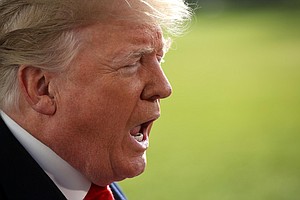12/10/2018

By Jen Psaki
(CNN) -- In the olden days of presidential appointments and nominations, the focus was justifiably on the nominees -- their background, what their policy positions said about the role they would play in an administration and whether or not they would get confirmed.
But the recent round of nominations in this administration also says a lot about Donald Trump. For one thing, all the nominees look the part -- a vapid and meaningless qualification that has, according to early transition team officials and Trump associates, proven to be a central driver in Donald Trump's decision-making on key appointments.
His newest selections? Friday, Trump announced that he has picked William Barr -- who served as attorney general under President George H.W. Bush -- to replace ousted AG Jeff Sessions. He also announced the selection of Heather Nauert -- the chief State Department spokeswoman -- to replace the outgoing Nikki Haley as US ambassador to the United Nations. At the same time, chief of staff John Kelly is reportedly headed out the door soon, with Trump eyeing Nick Ayers, Mike Pence's chief of staff, to replace him.
Here is my bet on what's behind Trump's picks.
Donald Trump believes that the job of the attorney general is to protect him.
It is a smart political move to nominate anyone who served under George H.W. Bush in a week where the late President's life of civility, collegiality and public service has been justifiably celebrated.
But Barr should not be mistaken for a mainstream or moderate pick. He is a strong defender of sweeping presidential power. Long before the Russia investigation and the national obsession with Special Counsel Robert Mueller, in 1992 Barr helped President George H.W. Bush pardon key witnesses in the Iran-Contra scandal, cutting the legs from under the independent prosecutor.
In more recent months he has defended Trump's firing of former FBI Director James Comey and advocated for investigating President Trump's political enemies, even defending the bizarre Uranium One conspiracy theory that targeted Hillary Clinton and has been debunked.
This nomination is about one thing: Donald Trump's survival.
He is betting on Barr's defense of the power of the President to fire anyone he wants at any time he wants; betting on his history of bucking independent prosecutors and his shared animosity for Trump's enemies. Trump is betting that as the person who will be overseeing the Russia investigation, and who is likely skeptical of the need for a subpoena Trump, Barr will protect him.
Donald Trump doesn't care about or understand the role of UN ambassador, but he does care about Secretary Pompeo and national security adviser Bolton.
Who the UN ambassador is (or what the United Nations does) is not of particular concern to President Trump. It is Secretary of State Mike Pompeo and national security adviser John Bolton who know from experience that the role can be a powerful one. The ambassador can publicly buck the administration, as Nikki Haley did, or serve as the unofficial leader of the diplomatic corps in New York -- driving the agenda and leading on key diplomatic relationships.
They don't want an ambassador who does that. They want to consolidate power between them and maintain control over the military-first, protectionist approach to foreign policy that they have driven in their roles. Nominating someone like Heather Nauert, without the relevant experience for this job, downgrading the role below cabinet level (as Pompeo has advocated for) will ensure that foreign policy-making and the center of power on international engagement remains in Washington between Foggy Bottom and Pennsylvania Avenue.
Heather Nauert has, for the most part, been an effective public speaker on behalf of the administration, and before that she was a visible and vocal Trump defender as an anchor on Fox News. They know they have a loyalist.
At the end of the day, President Trump relies on both Pompeo and Bolton, and after rocky relationships with their predecessors, he finally has two men in place who entertain his bombastic and arguably reckless approach to foreign policy. He is fine with Nauert serving in the UN role. He likes her; she is an effective public communicator. The rest doesn't matter to Trump. But Pompeo and Bolton do.
Donald Trump wants to see himself in Nick Ayers.
Chief of Staff John Kelly is rumored to be on the way out, and this time for real. All bets are pointing to Nick Ayers, Georgia native and current chief of staff to Mike Pence. While Kelly has been a loyalist, even when he shouldn't be, their relationship soured months ago and there has long been a rumor of change in the works.
So why Ayers?
To start, he is young, successful and seen as legitimate by the establishment Republicans and conservatives who are not die-hard fans of Trump.
And regardless of how shady his political consulting fees appear to be, he is an ambitious businessman.
(Ayers became wealthy in part from fees generated by his own political consulting firm and his former role as a principal in an ad-buying firm called Target Enterprises, which has served as the media buyer on nearly every race Ayers has worked on since he joined in 2011.This allowed him to earn a consultant's salary while also influencing campaign spending in a way that benefited him financially -- not illegal, just not quite kosher.)
Trump likely sees himself in Ayers and he wants his appointment to serve as an auspicious reflection.
With this new shakeup, Trump defenders and opponents can agree on one thing: With every departure, Donald Trump is getting more of the team he wants at his side.
But the risk for the country is that they are becoming more and more of a team of yes-men and -women unwilling to stand up to an increasingly threatened and off-the-rails President.
